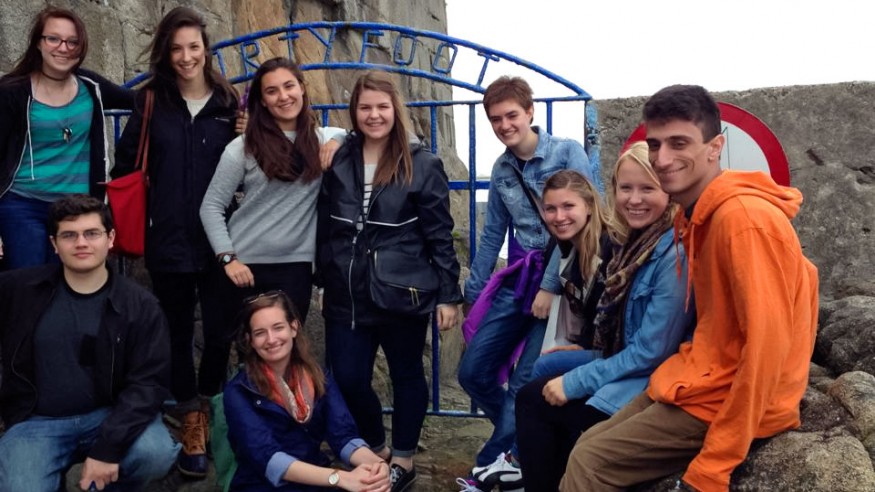
Travel-Learning Course, ‘Slouching Toward Empire: The Literary Politics of Ireland’
Learn how OWU’s many academic, research, and travel-learning programs prepare students for leadership and global citizenship and help them … Make the Connection.
As part of an Ohio Wesleyan Travel-Learning Course, students visited the Republic of Ireland and Northern Ireland to explore the historic intersection of literature and politics. They also attended a writers festival. (Photo courtesy of Chloe Dyer ’18)
Chloe Dyer ’18
Name: Chloe Dyer ’18
Major: Spanish
Minor: Politics and Government
Hometown: Guysville, Ohio
Experience: Travel-Learning Course, “Slouching Toward Empire: The Literary Politics of Ireland”
In May, Dyer and classmates traveled to the Republic of Ireland and Northern Ireland with Nancy Comorau, Ph.D., associate professor of English, to cap off their studies of how the island’s literature and politics intersect.
Lessons Learned: “[W]e spent the semester reading a variety of Irish works – novels, short stories, plays, and poetry – that chronicle the wars and political unrest that have shaped Irish history. While it may sound cliché to say that reading about these issues is nothing compared to seeing the places and talking to local people, in person, in this class it was completely true. Our travels across Ireland and Northern Ireland transformed what we’d read from words on the page and abstract concepts in the classroom to concrete, real-life experiences.
“There is a huge difference between reading about the 1916 uprising, for instance, and standing where Patrick Pearse surrendered to the British general or in the same prison yard where he and other rebellion leaders were executed. Abstract knowledge of fighting in the city was nothing compared to seeing bullet holes in statues on the Dublin streets. We saw handwritten first drafts of the William Butler Yeats’ poetry that we had read in class and walked the same path that Leopold Bloom did in an episode of James Joyce’s Ulysses (transforming my concept of Ulysses as a difficult and frustrating read to an incredible literary masterpiece).
“We had the opportunity to tour the walls that divide unionist and nationalist neighborhoods in Belfast with guides who were themselves ex-IRA and ex-UVF members, who had first-hand stories about Bobby Sands (the subject of a documentary we’d watched in class), done jail time for political crimes, or witnessed car bomb explosions in the streets.
“Even the locals we met in pubs or on buses were eager to tell us about how different the city had been not that long ago, with violence still commonplace, architecture designed to withstand terrorist attacks, and checkpoints surrounding the city center.
“For the last part of our trip, we shifted focus from the politics and history of Ireland to the Irish authors whose work we’d read. We attended the Listowel Writers Week, a weeklong festival featuring authors from Ireland and abroad. We had the chance to listen to prizewinning authors such as Anne Enright and Colm Tóibín discuss their work and their writing processes, hear poet Paul Durcan read from his anthology, and watch some incredible theater and films.
“Perhaps the high point of the week was hearing and meeting author Colin Barrett, whose short story collection Young Skins was on our syllabus for the last week of classes. Hearing authors speak about their work transformed my understanding of their writing. It was incredible to have the chance to hear writers discuss their writings and the roles they thought literature had in shaping the politics of Ireland, the topic we had discussed all semester.
“Ultimately, our journey across Ireland and Northern Ireland was an irreplaceable experience. It transformed what we’d learned in the classroom into something tangible and unforgettable. It reshaped my understanding of individual authors’ works; the implications and repercussions of both historic and recent political happenings on individual lives, cities, and countries; and how literature and politics intersect."
